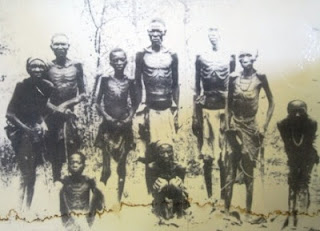Below are pictures from Tsumeb, Windhoek and Sports Day ! I have included captions as well. Enjoy! Comments are welcome!
Above is the abandoned mine tower in Tsumeb. Tsumeb was built around a large copper mine. The mine is gone, but a copper smelter remains.
The next group of photos are from the Namibian National Museum, located in Windhoek in the "Alte Feste" building.
Above is the Namibian coat of arms, found on the flag of Namibia.
This is the Namibian flag, with me documenting it. :)
The poster above urged voters to participate in the 1989 election for a free and fair Namibia. Namibia gained independence in 1990.
The photo above shows the 1st President of Namibia, Sam Nujoma, kissing Namibian ground upon re-entering the country after 30 years in exile.
Above is Mr. Nakale Leo, one of many Namibian prisoners kept on Robben Island during the fight for independence. Namibia was first under German colonial rule, and then under South African control, and an apartheid system. Honoring those who were brave in fighting for their country!
A dark part of Namibia's past, this photo documents the genocide of the Hererro people of Namibia under German colonial occupation.
This is the large, new Namibian independence museum, set to open in January of 2013. It was funded by the South Korean government.
Above is the beautiful Namibian Parliament. The parliament gardens are stunning. Especially hard to believe given that it is located in the middle of a desert!
Sports Day at our school - our men's team won! We invited 5 other schools to compete. The men competed in soccer and the women in netball - sort of a Namibian equivalent of basketball. It was a great day of athleticism!






















